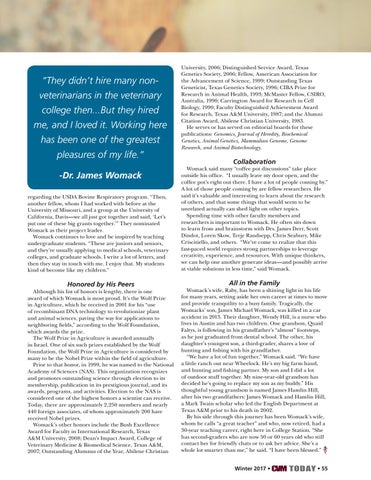“They didn’t hire many nonveterinarians in the veterinary college then...But they hired me, and I loved it. Working here has been one of the greatest pleasures of my life.” -Dr. James Womack regarding the USDA Bovine Respiratory program. “Then, another fellow, whom I had worked with before at the University of Missouri, and a group at the University of California, Davis—we all just got together and said, ‘Let’s put one of these big grants together.’” They nominated Womack as their project leader. Womack continues to love and be inspired by teaching undergraduate students. “These are juniors and seniors, and they’re usually applying to medical schools, veterinary colleges, and graduate schools. I write a lot of letters, and then they stay in touch with me. I enjoy that. My students kind of become like my children.”
Honored by His Peers Although his list of honors is lengthy, there is one award of which Womack is most proud. It’s the Wolf Prize in Agriculture, which he received in 2001 for his “use of recombinant DNA technology to revolutionize plant and animal sciences, paving the way for applications to neighboring fields,” according to the Wolf Foundation, which awards the prize. The Wolf Prize in Agriculture is awarded annually in Israel. One of six such prizes established by the Wolf Foundation, the Wolf Prize in Agriculture is considered by many to be the Nobel Prize within the field of agriculture. Prior to that honor, in 1999, he was named to the National Academy of Sciences (NAS). This organization recognizes and promotes outstanding science through election to its membership, publication in its prestigious journal, and its awards, programs, and activities. Election to the NAS is considered one of the highest honors a scientist can receive. Today, there are approximately 2,250 members and nearly 440 foreign associates, of whom approximately 200 have received Nobel prizes. Womack’s other honors include the Bush Excellence Award for Faculty in International Research, Texas A&M University, 2008; Dean’s Impact Award, College of Veterinary Medicine & Biomedical Science, Texas A&M, 2007; Outstanding Alumnus of the Year, Abilene Christian
University, 2006; Distinguished Service Award, Texas Genetics Society, 2006; Fellow, American Association for the Advancement of Science, 1999; Outstanding Texas Geneticist, Texas Genetics Society, 1996; CIBA Prize for Research in Animal Health, 1993; McMaster Fellow, CSIRO, Australia, 1990; Carrington Award for Research in Cell Biology, 1990; Faculty Distinguished Achievement Award for Research, Texas A&M University, 1987; and the Alumni Citation Award, Abilene Christian University, 1983. He serves or has served on editorial boards for these publications: Genomics, Journal of Heredity, Biochemical Genetics, Animal Genetics, Mammalian Genome, Genome Research, and Animal Biotechnology.
Collaboration Womack said many “coffee pot discussions” take place outside his office. “I usually leave my door open, and the coffee pot’s right out there. I have a lot of people coming by.” A lot of those people coming by are fellow researchers. He said it’s valuable and interesting to learn about the research of others, and that some things that would seem to be unrelated actually can shed light on other topics. Spending time with other faculty members and researchers is important to Womack. He often sits down to learn from and brainstorm with Drs. James Derr, Scott Dindot, Loren Skow, Terje Raudsepp, Chris Seabury, Mike Criscitiello, and others. “We’ve come to realize that this fast-paced world requires strong partnerships to leverage creativity, experience, and resources. With unique thinkers, we can help one another generate ideas—and possibly arrive at viable solutions in less time,” said Womack.
All in the Family Womack’s wife, Raby, has been a shining light in his life for many years, setting aside her own career at times to move and provide tranquility to a busy family. Tragically, the Womacks’ son, James Michael Womack, was killed in a car accident in 2013. Their daughter, Wendy Hill, is a nurse who lives in Austin and has two children. One grandson, Quaid Faltys, is following in his grandfather’s “almost” footsteps, as he just graduated from dental school. The other, his daughter’s youngest son, a third-grader, shares a love of hunting and fishing with his grandfather. “We have a lot of fun together,” Womack said. “We have a little ranch out near Wheelock. He’s my big farm hand, and hunting and fishing partner. My son and I did a lot of outdoor stuff together. My nine-year-old grandson has decided he’s going to replace my son as my buddy.” His thoughtful young grandson is named James Hamlin Hill, after his two grandfathers: James Womack and Hamlin Hill, a Mark Twain scholar who led the English Department at Texas A&M prior to his death in 2002. By his side through this journey has been Womack’s wife, whom he calls “a great teacher” and who, now retired, had a 30-year teaching career, right here in College Station. “She has second-graders who are now 50 or 60 years old who still contact her for friendly chats or to ask her advice. She’s a whole lot smarter than me,” he said. “I have been blessed.” Winter 2017 •
• 55
